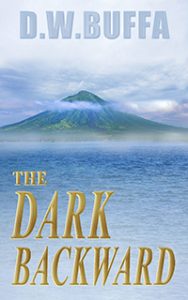 Q: After reading The Dark Backward, I’m tempted to say it is like Harry Potter meets Perry Mason, a mystical fantasy combined with a courtroom thriller, but let’s begin at the beginning. The title.
Q: After reading The Dark Backward, I’m tempted to say it is like Harry Potter meets Perry Mason, a mystical fantasy combined with a courtroom thriller, but let’s begin at the beginning. The title.
A: The Dark Backward. It is from Shakespeare’s The Tempest. The line reads: “What seest thou else in the dark backward and abysm of time?” The play takes place on an island full of mystery and full of magic.
Q: Like the island in The Dark Backward, an island that no one knew existed?
A: Yes, but an island on which a vanished civilization still exists. It is discovered in a place where no island is supposed to be and no one can figure out why no one had found it before.
Q: And it is on this island that a crime is committed, or what appears to be a crime, the murder of a child, an infant, and the accused is a young man who is living with a woman, his wife, who is apparently his sister?
A: That is part of the mystery. Is she really his sister, and how is it that he would not know? For that you need to read Plato.
Q: Plato? You have written a novel, a courtroom drama, and somehow Plato is involved? Would you like to explain?”
A: Plato wrote a dialogue in which someone recounts what he had heard from his grandfather who had in turn heard it from some ancestor of his who had heard it from an Egyptian priest, how the Athenians had once defeated the great empire of Atlantis and how Atlantis, a short time later, had been struck by an earthquake and sunk into the sea. The curious thing is that in that same dialogue, Plato remarks that even at his time the sea beyond the Pillars of Hercules, i.e. the Atlantic, was still not navigable because of all the earth stirred up by that great cataclysm. This would suggest that Atlantis was something more than an ancient myth. If Atlantis existed, and if it was destroyed by an earthquake, then there must have been some survivors. Those survivors are the ones who live on the island. What does that have to do with the question you asked about whether the young woman is or is not the sister of the accused? The most famous dialogue Plato wrote is The Republic in which nothing is private, everything, including property and women, are held in common. This silently raises the question about the moral status of incest. It also raises the question of what draws men and women together. The Dark Backward is a novel that takes up one of the two most basic human taboos.
Q: Is this the reason why William Darnell, the defense lawyer in your novel Evangeline, is again the lawyer? Because Evangeline dealt with the other taboo, cannibalism?
A: That is one of the reasons. The Dark Backward is, in a sense, a sequel, but the main reason is that Darnell is old enough to remember certain things that cast a needed light on what has happened, old enough to have read Kon-Tiki, when it first came out.
Q: The book by Thor Heyerdahl describing how he sailed on a balsa raft from the coast of South America to the south sea islands, proving that the people who settled the islands came from there. Your argument is that he did never asked where these people who sailed from South America came from themselves, correct?
A: That’s part of it. He talks about finding in the islands blue-eyed red-haired people, and he reports how there are still people in South America who talk about the people, god-like people, who taught them how to build cities and then went away, but he does not ask where they came from. He does not ask if they could have been the descendants of the survivors of Atlantis.
Q: If I remember correctly, there was another book written about an island, a lost civilization that was hidden from what we call the civilized world. I think you know the one to which I am referring.
A: The New Atlantis, the work by Francis Bacon in which a scientifically advanced civilization has discovered the technology by which to keep changing the location of the island on which it has maintained its existence, and that way remain isolated and alone. The New Atlantis was written to show what the new science could do. The Dark Backward was written to suggest that the results of that new science, modern science, may not be entirely to our advantage and that the ancient world had something we have lost, something it would be well to remember and try in some measure to reclaim.
Q: Now that you have finished The Dark Backward, what are you working on now?
A: A novel about ancient Athens, where, twenty five hundred years ago, some of the greatest names in history, Socrates and Pericles, Plato and Alcibiades, lived and fought and tried to understand the world and, in so doing, gave us the beginnings of civilization as we know it.
